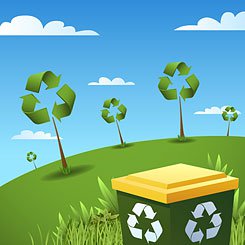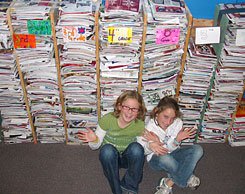Kids Rescue Trees by Rejecting Catalogs
Elementary school students take a stand against paper waste.
Your content has been saved!
Go to My Saved Content.
You know those annoying sales catalogs that show up a little too often in your overcrowded mailbox? The ones that go straight into the recycling bin? At the Park School, in Brookline, Massachusetts, where I teach fourth grade, these catalogs were a problem. We were receiving over 30 per day. Some weekly catalogs were addressed to teachers who had retired years earlier.
So we decided to do something about it.
We held a friendly "Catalog Canceling Challenge" among grades 3-5 to see which group of kids could cancel the most catalogs in 30 days. Some took school catalogs home to cancel, others canceled their parents' unwanted catalogs. Thinking the students might cancel a few hundred, I built a small wooden bin in a school hallway with three columns -- one for each grade -- to display their piles of canceled catalogs. This structure served as a physical bar graph showing the contest unfold over the month.
To both my delight and my dismay, all three columns were full in eight days, and the third grade started a wobbly 4-foot pile next to its side of the bin. I had to build additional columns for the kids to drop in more -- hundreds and hundreds more. They got into it and enjoyed doing their small part to help the environment. Some went door-to-door in their neighborhoods offering to cancel neighbors' catalogs; several children canceled more than 100 each.
After 30 days, 145 children in the three grades had opted out of 4,125 catalogs. If stacked, this would be a 30-foot-tall pile! Everyone was stunned by the results of their efforts.
Sounds encouraging, right? Consider, though, that, according to the Natural Resources Defense Council, the catalog industry mails out that many catalogs every six seconds. (Nineteen billion catalogs are mailed per year. That's 50 million a day, and, assuming 11 catalogs per inch, that's enough to make a 70-mile-tall stack of catalogs -- 12 times the height of Mount Everest -- each day.)

After some calculation, and assuming one canceled catalog represents at least four future catalogs not showing up, we determined that these students saved 50 trees and 50,000 gallons of water (it takes 3 gallons to make the paper for one catalog) and prevented the release of 6,000 pounds of carbon dioxide (the annual emissions equivalent of a couple of cars). These are impressive results that tie a simple kid-friendly action -- canceling catalogs -- to preventing deforestation, conserving water and energy, and slowing global warming.
Allowing children to take action about issues that they hear about and that may worry them helps them gain control over their world and some of its troubles. It gives them reassurance that they can make a difference and that we will solve these problems. As one of my students once said, "Earth is like a human. When the human gets a fever, we get chicken soup and get to watch TV. Then we get all better. When Earth gets a fever, it has no TV or chicken soup. So it doesn't get better as quickly. We need to do everything we can to give something like a TV or something like chicken soup to Earth right now."
In taking on this service-learning work -- like the recycling program the kids run at school, or the green movement and its implied life changes that are now sinking into our societal consciousness -- these children are providing our planet with some relief, helping in its time of need. Giving her some chicken soup! (Oh, and by the way, their parents were thrilled to get rid of those pesky catalogs.)
After our class participated in a live interview on NBC's Today Show, other schools, and Girl Scout troops, have joined our project. In fact, more than 3,600 children in eight states have now canceled 22,000 catalogs, and we hope that dozens of other schools, as well as Scout troops, church groups, summer camps, soccer teams, community centers, and others will join and help us reach our goal of canceling 100,000 catalogs.
If you know any green teachers or kids who want to make a difference this Earth Day 2009, pass our idea on to them.
This story originally appeared in the Huffington Post. Reprinted by permission of the author.